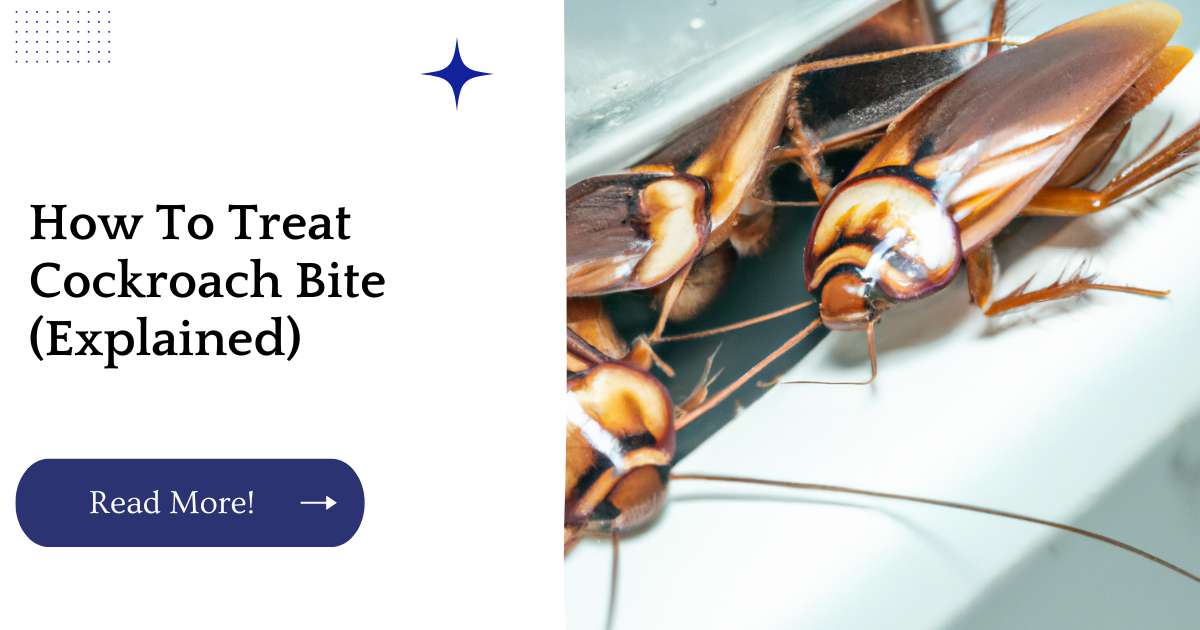Cockroaches are the scourge of many households, and they can be difficult to eradicate. If you’ve been bitten by a cockroach, you’ll want to know how to treat this type of injury.
Read on to learn about some common treatments for cockroach bites and how soon after being bitten you should see a doctor if necessary.
| Takeaways |
|---|
| Cockroach bites are not a significant health threat but can cause allergic reactions in some individuals. |
| Symptoms of cockroach bites include red bumps on the skin, swelling, and itching. |
| Keeping a clean and hygienic living environment is the best way to prevent cockroach bites. |
| Natural remedies such as lemon juice, aloe vera, and turmeric can be used to soothe cockroach bites. |
| If your symptoms are severe or continue to worsen, it is recommended to seek professional medical attention. |
Rinse The Area With Clean Water
Once you’ve removed the cockroach, rinse the area with clean water. Use soap or detergent to clean any dead parts of the cockroach that remain on your skin. Rinse again with clean water and dry using a fresh cloth.
Use An Antibiotic Ointment
The first thing you should do is apply an antibiotic ointment (such as Neosporin) to the bite. It can help prevent infection, which could be a serious problem if left untreated.
It’s important to use a topical antibiotic ointment, not an oral one like an antibiotic pill or prescription medication. Topical antibiotics don’t enter the bloodstream but instead stay on top of the skin where they’re applied and prevent bacteria from growing in wounds caused by cockroach bites.
Apply the ointment liberally over all areas where you were bitten by roaches so that it forms a protective layer around your skin to keep out germs and promote healing.
You may want to put on some gloves before applying this cream so that you will avoid getting any residue on other parts of your body; however, keep in mind that even though insecticides are toxic for humans, they aren’t nearly as harmful as what’s found in most household cleaning products!
So long as we take care not ingest anything containing these chemicals (which is why we recommend wearing gloves when using them), there shouldn’t be any risk involved when using insecticides from home improvement stores like Lowe’s or Home Depot etcetera…
Don’t let cockroaches jeopardize the health of your household, take the necessary steps to prevent infestations by following our tips on preventing cockroach infestations.
Apply A Hydrocortisone Cream
Hydrocortisone cream is a steroid cream that can help reduce swelling and redness from insect bites.
Hydrocortisone cream is available over-the-counter. You can apply it 2-3 times a day until the itching and irritation goes away.
Apply An Ice Pack
If you’ve been bitten by a cockroach, the first thing to do is apply an ice pack to the affected area. This will reduce swelling and pain, and also help your body recover from the poison in the cockroach’s saliva.
If you don’t have access to an ice pack (or if it’s too late at night for anything other than a bag of frozen peas), use a bag of frozen vegetables or peas for 15 minutes at a time until morning comes around.
If you’re feeling particularly brave and want to try out some home remedies, there are some things you could try:
- Wash off the bite with soap and water; then apply aloe vera gel directly onto bite marks (or cover them entirely) until they disappear completely.
- Crush sage leaves in water; then strain out leaves using cheesecloth (or another fine mesh). Apply mixture using cotton balls or gauze pads directly on bite marks until they disappear completely.
Instead of resorting to chemical pesticides, try out these natural remedies for cockroach control that are both effective and environmentally friendly.
Take An Antihistamine, If Needed
If you are prone to allergies and have been bitten, or if you have a medical condition that may make you more sensitive to insect bites, be sure to check with your doctor before taking an antihistamine.
Some antihistamines can cause drowsiness while others can cause dry mouth, blurred vision, and constipation.
If you do take an antihistamine, be careful when driving or operating machinery.
Take A Pain Reliever, If Needed
If a cockroach has bitten you, you may need to take pain medication. The most common type of pain reliever from a store is an ibuprofen (Advil or Motrin) or acetaminophen (Tylenol).
You can use these medicines as soon as possible after being bitten by a cockroach. They may help reduce swelling and itching.
In rare cases, it may be necessary to take more than one dose of the medicine over several days.
Get rid of cockroaches for good with our compilation of 15 effective methods that are backed by science and easy to do at home.
Elevate The Affected Area
Elevate the affected area above your heart. This will help reduce swelling.
Why this is important: If you don’t elevate the affected area, it will swell up and become painful. This can be dangerous if it reaches a certain size, as it could potentially stop electrical signals from getting through to your brain or cause blood to stop flowing normally in your body.
How to do it: Simply tilt your arm up toward you when sitting down or raise it above you while standing upright.
Clean The Wound Regularly
Clean the wound with soap and water. Be sure to wash your hands thoroughly before touching the area you’ve bitten to prevent spreading bacteria or viruses.
Dry the area with a clean towel or cloth, then cover it with a bandage if there is bleeding.
Do not use alcohol or hydrogen peroxide on the wound, as these products can irritate it further and cause pain when they come into contact with living tissue. Iodine may also damage skin cells; avoid using this substance as well if possible (note that iodine tincture works differently from regular iodine).
If you have access to an antibiotic ointment—such as Neosporin®—you may apply this after washing off any dirt from around your bite wound if desired; however, keep in mind that many over-the-counter medications are not meant for human consumption so do not ingest them unless instructed by a medical professional first!
Curious about the types of cockroaches that can grow in your home? Check out our extensive guide on the most common species of cockroaches that are found in households and learn how to prevent them from spreading
Keep The Wound Dry And Covered, At Least Until It Forms A Scab Or Heals Slightly
You should keep the wound dry, covered, and elevated. This will help it heal quickly. You should also cleanse the bite with soap and water before covering it to prevent bacteria from getting into your system.
Wounds cannot be treated like other types of infections; they are much more delicate and need special care in order to get better as quickly as possible.
Watch For Signs Of An Infection And Seek Medical Care If They Arise
If you see redness, swelling, pain and warmth around your bite site within a few hours of the bite (and not from other causes such as an allergic reaction), you may have an infection. Seek medical care immediately if you have any of these symptoms.
Although it’s rare for cockroach bites to become infected, they can cause severe health problems if left untreated. If your bite becomes infected with bacteria or fungi that enter through the skin, there are several options for treatment:
Antibiotics: Antibiotics can kill many different types of germs that cause disease in humans and animals.
These include Streptococcus pyogenes (strep throat), Escherichia coli O157:H7 (E coli), Salmonella typhi and Klebsiella pneumoniae — all common causes of food poisoning — as well as Pseudomonas aeruginosa and Staphylococcus aureus — often responsible for hospital-acquired infections.
Keep your home clean and free from cockroaches by following our tips on how to keep cockroaches out of your house and ensure the safety and well-being of your family
Conclusion
If you have a cockroach infestation at home, it’s important to take action right away. The longer you wait, the more likely it is that these pests will spread throughout your home and cause even more damage.
It can be difficult to get rid of them on your own, but there are ways to do so with professional help from a pest control company like Terminix®.
Further Reading
Cockroach Bite Overview- Australia Wide First Aid – A comprehensive blog post that discusses the signs and symptoms of cockroach bites, and offers tips for their prevention.
How to Identify and Treat Cockroach Bites -Lake Norman Pest Control – A short but informative article that outlines the signs of cockroach bites and provides helpful tips on their treatment.
Do Cockroaches Bite? – Rentokil Indonesias – An informative article that answers some common questions about cockroach bites and explores measures to avoid them.
FAQs
What are the symptoms of a cockroach bite?
Cockroach bites usually manifest as red bumps on the skin with a dark spot in the center. Other symptoms may include swelling, itching, and pain.
Are cockroach bites dangerous?
Cockroach bites on their own do not pose a significant medical threat unless they become infected. However, they can trigger an allergic reaction in some individuals, which can lead to severe swelling and breathing difficulties.
How long does it take for a cockroach bite to heal?
The amount of time it takes for a cockroach bite to heal depends on the severity of the wound. Typically, it takes anywhere from a few days to a week for a bite to heal.
How can I prevent cockroach bites from happening?
The best way to prevent cockroach bites is to keep a clean and hygienic living environment. You may also want to use insecticides or seek professional pest control services if roaches persist.
Can cockroaches transmit diseases through their bites?
There is no evidence to suggest that cockroaches transmit diseases through their bites. However, they can carry disease-causing pathogens on their bodies, which can contaminate food and surfaces in your home.

Hello! I’m Hellen James, and I write about how to keep pests from invading your home. For the last 10 years, I’ve been working in pest control and am excited to share my expertise with you!


